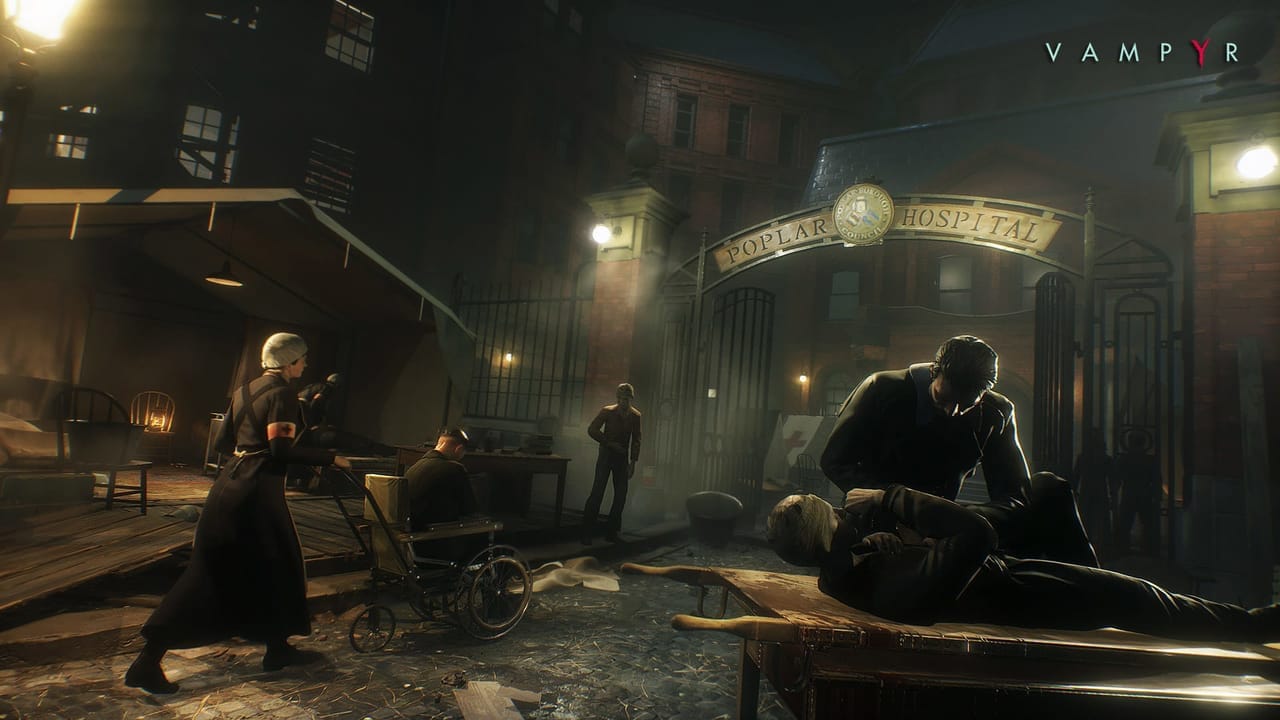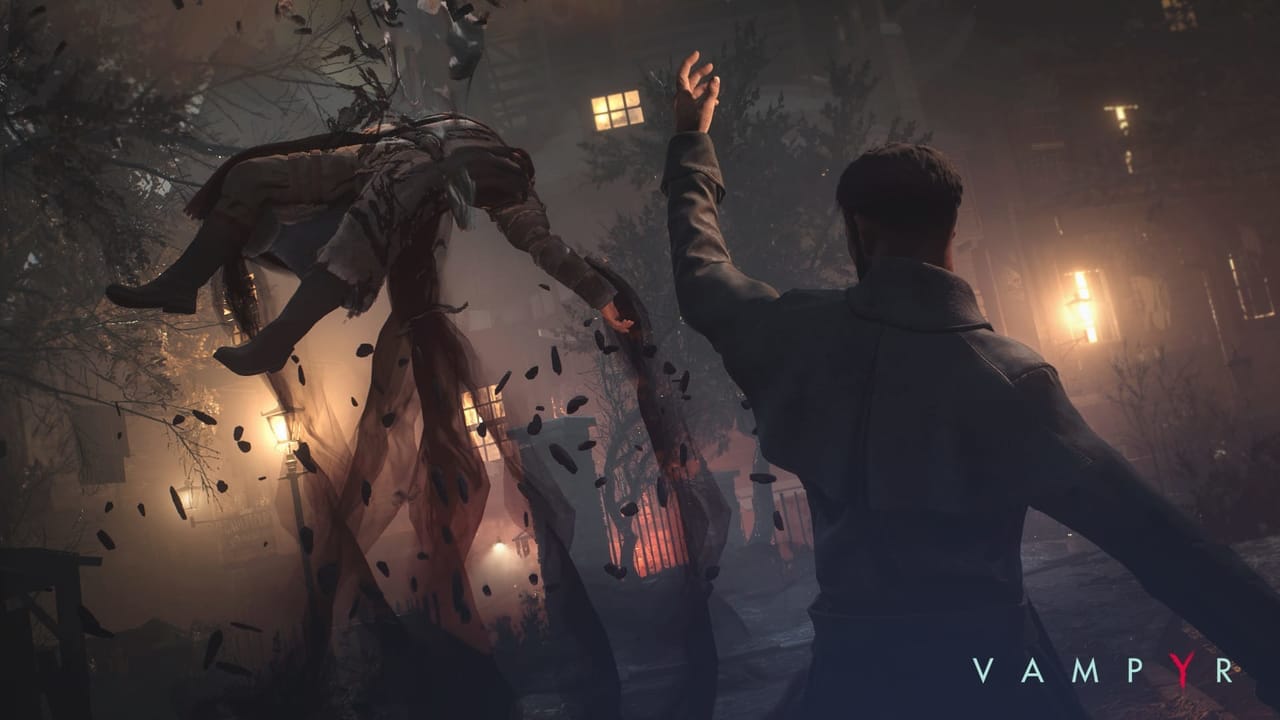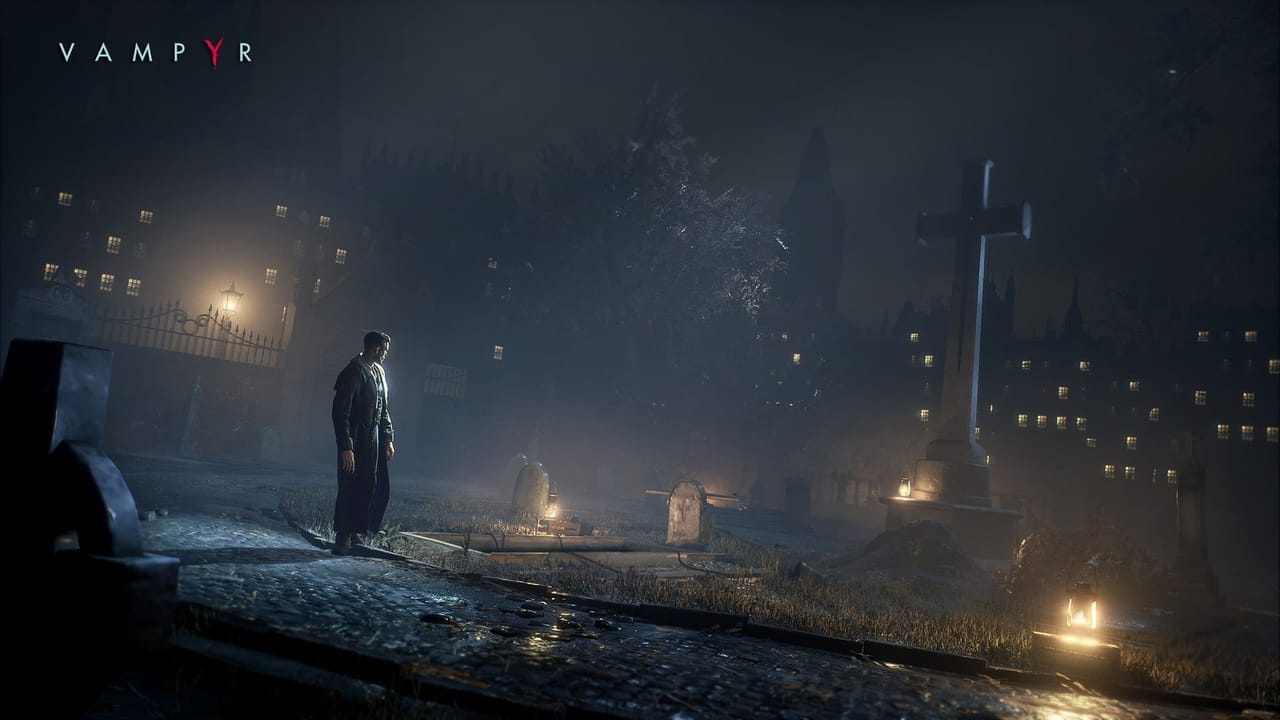Morality in games is something of an old trick by now. Especially in RPGs, the days of a binary choice system are long gone. Many players look for something more complex and dynamic, but most games fail to deliver on that promise. Worse still, fewer games can provide that complexity through game mechanics. Vampyr, the latest game by Dontnod Entertainment, tries to marry that proposition together. You play Dr. Jonathan Reid, a WWI army doctor who recently returned to London during the 1918 Spanish Flu epidemic. Unfortunately, Reid was also turned into a vampire. Through the course of the game, you begin to unravel the horrific origins of the epidemic in a desperate struggle to cure those of the disease, while you hunger for blood.
The big selling point of Vampyr is the moral quandary Reid finds himself in. Reid’s inner conflict sees him pulled between two worlds; his humane, doctor side and his now monstrous, vampiric side. The game cleverly makes Reid a doctor to uphold a sense of authority in investigating the epidemic and give players a chance to heal and help the sick.
Healing sick NPCs or simply discovering different hints about their past opens dialogue options with them. You can also do a simple fetch quest to gain more affinity with them. This, in turn, gives you a closer bond with them which improves their blood quality. In an interesting twist, you are encouraged to help the games over 50 NPCs…and kill them once you've done so to harvest experience points and level up.

NPC’s yield different amounts of experience based on their blood quality. Higher level NPC’s require higher levels of the Mesmerize ability to charm them. Mesmerize only levels up during the story, so even the blood quality gain is paced perfectly with the power creep. Some NPC’s are innocent, some are criminal. All have emotional baggage of some kind to contend with. While their characterization across the board is fairly one-note, the interactivity you do have with them is paramount to not only your growth as a character but the flavor of the world around you.
This is the best mechanic in Vampyr, and the one with the most emotional weight put into it. Improving the quality of their blood, in turn, can give the player a large amount of experience gain, something that will require heavier grinding to achieve without killing them. Choosing not to kill NPCs will then keep you underpowered as the game progresses. The choice of how powerful a vampire the player becomes is squarely in their hands. As a mechanic, this is brilliant in conveying the moral complexity of your actions.
Your actions also carry weight in the mechanical sense based on who you help or kill. The epidemic has hit each of the games four districts hard, so killing too many NPCs or ignoring the needs of a district for too long will see it slowly lower into a critical range. That leads to NPCs going missing, the loss of their quest lines, and more enemies patrolling the world map in those districts. You can’t go back on a save file in Vampyr, Dontnod is effectively forcing the player to live with their choices, no matter how good or bad they are.
With power and progress tied to the players choice, Vampyr contains a moral dimension that is strangely absent in most RPGs. Do you try to be morally good the entire time? Do you need to kill an NPC for their quick XP gain to boost your powers against hardened enemies? Or do you kill at your leisure, regardless of consequence? This choice of power and development is a crowning achievement, and I want to see more RPGs that deal with horror creatures like vampires tackle this mechanic fully.

Unfortunately, the system is also exploitative. As you only level up when you sleep in a safe house, it is possible to game the system by filling up on tons of quests, NPC deaths and grinding out enemy kills, grow a decent amount of levels, and never really sleep again afterward. The idea makes sense, but mechanically you can be overleveled in without the massive penalty the game intended for you.
Sadly, the rest of Vampyr pales in comparison to this mechanic. In terms of combat and progression, it’s standard action-RPG fair, using weapons and your powers to take down hordes of enemies. The variety of enemies you fight is small for one, leading to a small amount of tactics to contend with. Combat also becomes rote depending on how you choose to attain power. Players who gain massive amounts of XP will breeze through enemies in a few hits, while folks who choose to not kill will need to adapt hit and run tactics to survive. It’s not a broken mechanic but it is boring, and that's a problem this game really suffers from.
Boredom is tricky to hammer down. Players obviously have different thresholds of what makes a game boring, but often it is the combination of mechanics and presentation that really hammer it home. For Vampyr, this happens more often than it should. The level design is a small, semi-open world filled with dark alleys, abandoned buildings, and labyrinthian sewer levels. Once you go down one street, you pretty much have the full layout of what you would expect to see. All of the sections of London showcase the drab, decaying architecture as the city succumbs to the epidemic. Enemy placement is always the same respawn points each time you rest. So after a while there are no surprises as to what and where you fight.
Most telling of all, the overall narrative and voice over work are mediocre at best. Part of the problem is the framing of characters being simple close-ups of the character models as they speak. A similar issue happened with Mass Effect: Andromeda, where the canned animations and lower graphical quality really tarnished the presentation. What Andromeda had that Vampyr doesn’t, however, is personality.

Characters tend to speak in monotones with stiled, eloquent speech juxtaposed with cockney accents. Surprisingly, the emotion of the dialogue rarely shines through. Reid himself is the biggest offender. His gravelly-voiced delivery often lacks any form of emotion save a few outbursts scattered across the games. Anthony Howell, Reid’s voice actor, is usually good at providing emotion and context in his words. His work in games such as SOMA and Dragon Age: Inquisition stands as a testament to that, but here it falls completely flat.
The narrative doesn’t help much either in this case. The biggest problem with the game is the relatively breakneck pace of the overall plot. Within the span of an hour, for example, Reid can work with or against several factions – all without really much context to them – over the span of three main story missions. The jumps between chapters also feel wholly disconnected from each other, although to the game's credit it does tie up loose ends by the final hours of the plot. Ultimately, that plot lacks any bite, loses a lot of context, and squanders a chance for deeper world building.
You can see this in how the factions of the game are treated. There are hints of power struggles between different human and vampire groups, but never a payoff. You have sections where these factional politics seem like they come into play but never go beyond the surface of things. As an RPG, this is a missed opportunity to intertwine the already complex morality system to the faction’s own affinity and provide a new avenue of the narrative to spice up the relative blandness of the overall game.
I do like Vampyr, but it feels full of wasted potential. The ideas behind it are great and unique, and Dontnod should be commended for experimenting with the RPG formula this way. It is worth a playthrough just for the vampire-style mechanics. The rest of the game simply struggles to be impressive. Vampyr is ultimately a competent game but forgettable experience. RPG fans should check it out, but otherwise, it is hard to recommend Vampyr as a must-have title for anyone's collection.
Our Vampyr review was conducted on PlayStation 4 with a code provided by the publisher. It is also available on Xbox One and PC via Steam and Origin
Review Summary
Pros
- Excellent Morality/Mechanics Implementation...
- Interesting Premise...
- Strong Musical Score...
- Doesn't Do Anything Wrong...
Cons
- ...That Can Be Exploited Too Easily.
- ...With a Mediocre Narrative.
- ...Bland Graphics.
- ...But It is Really Boring to Play Through.
Have a tip, or want to point out something we missed? Leave a Comment or e-mail us at tips@techraptor.net

.jpg?itok=eG3w00nI)






